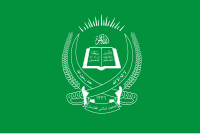Jamiat Islami
|
Jamiat-e Islami
جمعیت اسلامی افغانستان |
|
|---|---|
 |
|
| Leader | Salahuddin Rabbani |
| Founder | Burhanuddin Rabbani |
| Founded | 1968 |
| Ideology |
Islamism Communitarism Afghan Tajik interests |
| Religion | Islam |
| Seats in the House of the People |
23 / 249
|
| Seats in the House of Elders |
0 / 102
|
| Party flag | |
 |
|
| Website | |
| Facebook page | |
Jamayat-E-Islami (also rendered as Jamiat-e-Islami and Jamiati Islami; Persian: جمعیت اسلامی افغانستان; "Islamic Society"), sometimes shortened to Jamiat, is a Muslim political party in Afghanistan. The majority of the party, the oldest Muslim political party in Afghanistan, are ethnic Tajiks of northern and western Afghanistan. It has a communitarian ideology based on Islamic law but is also considered moderately progressive. During the Soviet war in Afghanistan and the following civil war in Afghanistan, Jamiat-e Islami was one of the most powerful of the mujahideen groups. Former President of Afghanistan Burhanuddin Rabbani led the party from 1968 to 2011.
Jamiat "emerged" in 1972 from among "the informal Islamist groupings that had existed since the 1960s". Led by Burhanuddin Rabbani, a professor of Islamic theology at Kabul University, it was inspired by Abul A'la Maududi and his Jamaat-e-Islami Pakistan party in Pakistan. When Rabbani's arrest was ordered by Mohammad Daoud Khan in 1973, it was to Pakistan that Rabbani fled, and Jamaat-e-Islami who initially hosted him there. (Later Jamait lost the backing of Jamaat-e-Islami to the more purist Hezb-i Islami.) In Pakistan, Professor Burhanuddin Rabbani gathered important people and continued to build the party. Sayed Noorullah Emad, who was then a young Muslim at Kabul University became its general secretary and, later, its deputy chief. Some of its prominent commanders of included Ustad Zabihullah, Ahmad Shah Massoud, Ismail Khan, Atta Muhammad Nur, Mullah Naqib and Dr. Fazlullah.Ahmad Shah Massoud directed the military wing of the party.
...
Wikipedia
